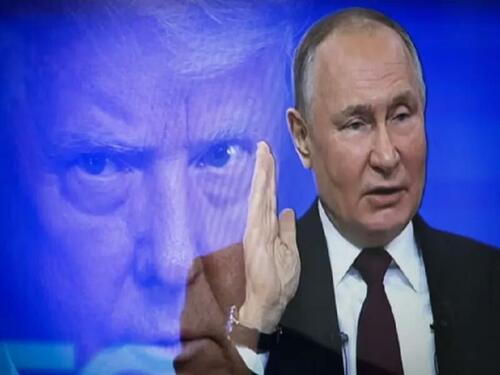Authored by Andrew Korybko via Substack,
Trump’s latest escalation against Russia took the form of imposing severe sanctions against its top two energy companies, canceling his planned meeting with Putin, and now declaring that they won’t meet again unless it’s to finalize a deal over Ukraine.
The Wall Street Journal (WSJ) wrote about the implications of his flip-flop here, insinuating that they presage an intensified US proxy war of attrition on Russia.
The present piece will briefly explore what form this could take and its likelihood of success.
The WSJ posits that “The drone revolution…means that neither side is likely to make major territorial strides soon”, but left unsaid is that this is also due to continued NATO support for Ukraine, including the bloc’s purchase of US weapons at full price for transfer to there per the new scheme from last summer.
Maintaining this de facto balance of drone and conventional forces, which is due to NATO’s indispensable support for Ukraine, is therefore the US’ top priority if wants to atrophy Russia’s strength with time.
The second part of what’s arguably Trump’s new three-phase strategy against Russia is to strictly enforce compliance with the latest sanctions, especially when it comes to Russia’s Indian and Chinese partners that together comprise the RIC core of BRICS, in order to greatly reduce Russia’s foreign revenue flows. The purpose is to set the stage for socio-economic troubles in Russia while gradually eroding its Great Power status if India, China, and others start to keep it at arm’s length to avoid crushing punitive tariffs.
And finally, the last part aims to incite unrest within Russia by exacerbating its aforesaid socio-economic troubles through likely support for more Ukrainian long-range strikes against oil refineries and other critical infrastructure, believing that rapidly worsening living standards will turn the population against Putin.
The idea is that political pressure from below would complement economic, political, and military pressure from abroad to coerce him into freezing the front without any concessions from Ukraine.
Each part of Trump’s new three-phase strategy against Russia has its drawbacks.
Beginning with the first, the financial burden for maintaining the de facto balance of forces in this proxy war falls on Europe, some of whose states might prefer to reduce expenditures on US arms for Ukraine in favor of replenishing their stockpiles. There’s also growing interest in prioritizing the European military-industrial complex over the US’. It therefore can’t be taken for granted that the frontlines will hold indefinitely.
As for the second, it was explained here why India and China aren’t expected to fully stop importing Russian energy, namely because the spike in prices would harm their economic growth more than punitive US tariffs would. Neither also wants to dump Russia at the risk of their rival strengthening ties with it at what might then be their expense. While Russia’s foreign revenue flows might drop, its war chest can keep funding the conflict for a few more years at least, thus delaying the sanctions’ impact.
Lastly, the Russian people remained calm during much more difficult times in World War II and after the Soviet collapse than whatever they might experience from large-scale Ukrainian strikes against their critical infrastructure, so they’re not expected to engage in serious unrest.
The security services are also strong enough to deal with whatever might unfold in any case.
For these reasons, the US’ intensified proxy war of attrition against Russia likely won’t succeed, but it might still deal some damage.
Loading recommendations...
